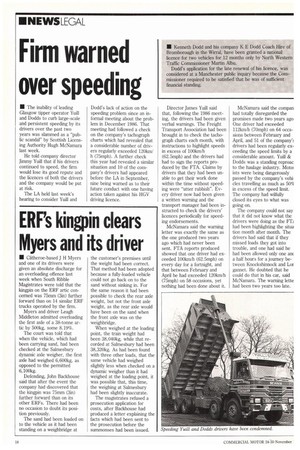Firm warned over speeding
Page 16

If you've noticed an error in this article please click here to report it so we can fix it.
• The inability of leading Glasgow tipper operator Yuill and Dodds to curb large-scale and persistent speeding by its drivers over the past two years was slammed as a "public scandal" by Scottish Licensing Authority Hugh McNamara last week.
He told company director Jimmy Yuill that if his drivers continued to speed, the firm would lose its good repute and the licences of both the drivers and the company would be put at risk.
The LA held last week's hearing to consider Yuill and Dodd's lack of action on the speeding problem since an informal meeting about the problem in December 1986. That meeting had followed a check on the company's tachograph charts which had revealed that a considerable number of drivers regularly exceeded 120km/ h (75mph). A further check this year had revealed a similar situation and 10 of the company's drivers had appeared before the LA in September, nine being warned as to their future conduct with one having action taken against his HGV driving licence. Director James Yuill said that, following the 1986 meeting, the drivers had been given verbal warnings. The Freight Transport Association had been brought in to check the tachograph charts each month, with instructions to highlight speeds in excess of 100krn/h (62.5mph) and the drivers had had to sign the reports produced by the FTA. Claims by drivers that they had been unable to get their work done within the time without speeding were "utter rubbish". Every driver now had been given a written warning and the transport manager had been instructed to check the drivers' licences periodically for speeding endorsement& McNamara said the warning letter was exactly the same as the one produced two years ago which had never been sent FTA reports produced showed that one driver had exceeded 1001un/h (62.5mph) on every day for a fortnight, and that between February and April he had exceeded 120krn/h (75mph) on 58 occasions, yet nothing had been done about it. McNamara said the compan had totally disregarded the promises made two years ago One driver had exceeded 112Iun/h (70mph) on 64 occasions between February and April, and 51 of the company': drivers had been regularly exceeding the speed limits by a considerable amount. Yuill & Dodds was a standing reproac to the haulage industry. Moto, ists were being dangerously passed by the company's vehi. cies travelling as much as 5091 in excess of the speed limit. The company had wilfully closed its eyes to what was going on.
The company could not say that it did not know what the drivers were doing as the FT/ had been highlighting the situa tion month after month. The drivers had said that if they missed loads they got into trouble, and one had said he had been allowed only one an a half hours for a journey between Knockshinnock and Lor gannet. He doubted that he could do that in his car, said McNamara. The warning lette had been two years too late.










































































































